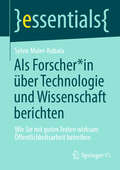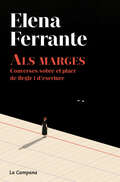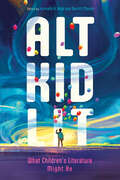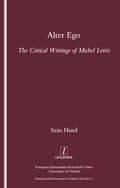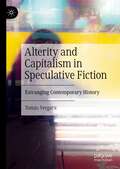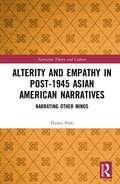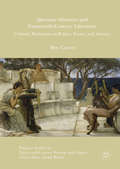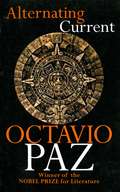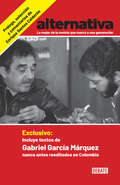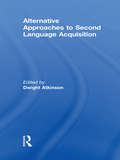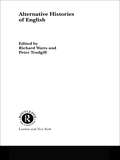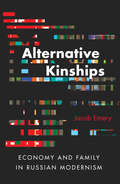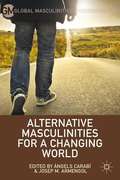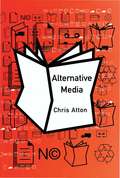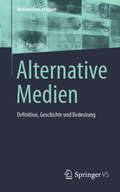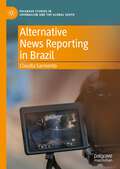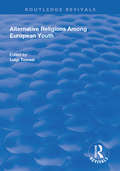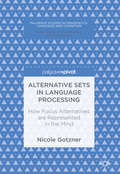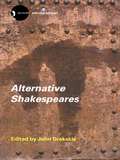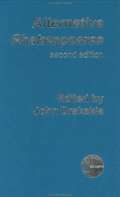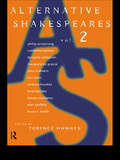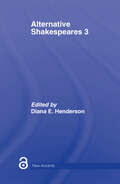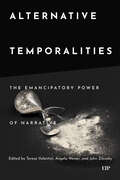- Table View
- List View
Alphafriends® Cards, Grade K (Into Reading)
by Houghton Mifflin Harcourt Publishing CompanyNIMAC-sourced textbook
Als Forscher*in über Technologie und Wissenschaft berichten: Wie Sie mit guten Texten wirksam Öffentlichkeitsarbeit betreiben (essentials)
by Sylvie Maier-KubalaIn diesem essential erfahren Sie, wie Sie als Forscher*in ansprechende Texte über Ihre Arbeit schreiben, die Aufmerksamkeit in der Öffentlichkeit generieren. Sie erhalten eine Einordnung, welche Inhalte sich für Wissenschaftskommunikation eignen und wie es Ihnen gelingt, komplexe Themen auf ihre Essenz zu reduzieren. Im Band finden Sie zudem eine Anleitung, wie Sie Texte sinnvoll strukturieren und Sprache und Stil an Ihre Zielgruppe anpassen. Sie erhalten wertvolle Tipps, wie Sie Ihre Texte so planen und veröffentlichen, damit sie in der allgemeinen Informationsflut nicht untergehen. Zahlreiche Übungen aus dem kreativen Schreiben runden die einzelnen Kapitel ab, von der Ideenfindung bis zum fertigen Text.
Als marges: Converses sobre el plaer de llegir i d'escriure
by Elena FerranteLa «cambra pròpia» d'Elena Ferrante: les lliçons de literatura de l'autora que més intriga suscita entre els lectors de tot el món, amb més de vint milions de lectors. Elena Ferrante dibuixa un recorregut històric i personal sobre la inspiració i sobre la crida que va sentir des de ben menuda per esdevenir una escriptora. Així, de mica en mica, ens enumera les figures clau de la seva formació literària i alhora va afinant els seus consells sobre la creació dels personatges i de la trama. Des de Shakespeare fins a Gertrude Stein, passant per les obres de Diderot, Jane Austen o Virginia Woolf, fins a la culminació amb Dante i Beatriu, la Ferrante relliga les seves lectures amb l'obra i la biografia pròpies i per primera vegada les comparteix amb el lector des d'una nova intimitat. «Quan escric, ni tan sols jo sé qui soc».Gazzetta del Sud
Alt Kid Lit: What Children's Literature Might Be (Children's Literature Association Series)
by Kenneth B. Kidd and Derritt MasonContributions by Kristopher Alexander, Amanda K. Allen, Brianna Anderson, Catherine Burwell, Katharine Capshaw, Negin Dahya, Gabriel Duckels, Paige Gray, Gabrielle Atwood Halko, Natasha Hurley, Kenneth B. Kidd, Erica Law-Montes, Derritt Mason, Brandon Murakami, Tehmina Pirzada, Cristina Rhodes, Cristina Rivera, Jakob Rosendal, TreaAndrea M. Russworm, Vivek Shraya, Victoria Ford Smith, Joshua Whitehead, and Shuyin Yu How do we think about children’s and young adult literature? Children’s literature is often defined through audience, so what happens when children are drawn to and claim genres not built expressly “for” them? To what extent do canonical formations tend to overwrite or obscure less visible efforts to create and promote material for the young? These are the driving questions of Alt Kid Lit: What Children's Literature Might Be. Contributors to the volume offer theoretical meditations on the category of children’s and young adult literature as well as case studies of materials that complicate our understanding of such. Chapters attend to a diverse array of subjects including the “non-places” of children’s literature; child mediums; Black theater for children; children’s interpretive drawings; fanfiction; Latinx, Indigenous, and silkpunk speculative fiction; environmental zines; shōnen anime; Jim Henson's The Dark Crystal; South Asian television; and “emergency children’s literature.” The book also features interviews with two experimental writers about genre and alt-publishing and a roundtable conversation on video games and children’s digital engagements. Building on diverse approaches including queer theory and postcolonial studies, Alt Kid Lit shines light on materials, methodologies, and epistemologies that are sometimes underacknowledged in the field of children’s and young adult literature studies.
Alter Ego: The Critical Writings of Michel Leiris
by Sean Hand"Alter Ego is the first monograph in English on the critical writings of Michel Leiris (1901-90). A groundbreaking autobiographer and pioneering ethnographer, Leiris also produced important criticism on art, opera, jazz and literature, which acts as a key commentary on twentieth-century intellectual movements and demonstrates vividly the constant refashioning and reformulation of contemporary ideas and aesthetics. Hand defines and situates Leiris's core themes, analyses his criticism in each of the art areas examined, and delineates the model that emerges of a contrapuntal and heterogeneous critical identity."
Alterity and Capitalism in Speculative Fiction: Estranging Contemporary History
by Tomás VergaraSpeculative fiction has been traditionally studied in Marxist literary criticism, following Darko Suvin’s paradigmatic model of science fiction, according to a hierarchical division of its multiple subgenres in terms of their assumed inherent political value. By drawing on an alternative genealogy of Marxist criticism, this book presents a non-hierarchical understanding of the estrangement connecting all varieties of speculative fiction, outlining the political potential shared across the spectrum of speculative fiction, along with the specific narrative strategies by which it critically engages with its historical context of production. This study’s main point of contention is that speculative fiction performs an estrangement effect on historical reality that can potentially render visible the role of fantasies in the organisation of capitalist social practice. This narrative effect enables an estranged perspective by which the novel interprets and conceptualises historical reality in a totalising manner.
Alterity and Empathy in Post-1945 Asian American Narratives: Narrating Other Minds (Narrative Theory and Culture)
by Hyesu ParkThis book examines how Asian American authors since 1945 have deployed the stereotype of Asian American inscrutability in order to re-examine and debunk the stereotype in various ways. By paying special attention to what narrative theorists have regarded as one of the most extraordinary aspects of fiction—its ability to give (or else deny) readers a remarkably detailed knowledge of the inner lives of their characters—this book explores deeply and systematically the specific ways Asian American narratives attribute inscrutable minds to Asian American characters, situating them at various points along a spectrum stretching between alterity and empathy. Ultimately, the book reveals the link between narrative form and larger cultural issues associated with the representation of Asian American minds, and how a nuanced investigation of narrative form can yield insights into the sociocultural embeddedness of Asian American literature under the case studies—insights that would not be available if such formal questions were by passed.
Alternate Histories and Nineteenth-Century Literature: Untimely Meditations in Britain, France, and America (Palgrave Studies in Nineteenth-Century Writing and Culture)
by Ben CarverThis book provides the first thematic survey and analysis of nineteenth-century writing that imagined outcomes that history might have produced. Narratives of possible worlds and scenarios--referred to here as "alternate histories"--proliferated during the nineteenth century and clustered around pressing themes and emergent disciplines of knowledge. This study examines accounts of undefeated Napoleons after Waterloo, alternative genealogies of western civilization from antiquity to the (nineteenth-century) present day, the imagination of variant histories on other worlds, lost-world fictions that "discovered" improved relations between men and women, and the use of alternate history in America to reconceive the relationship between the New World and the Old. The "untimely" imagination of other histories interrogated the impact of new techniques of knowledge on the nature of history itself. This book sheds light on the history of speculative thought, and the relationship between literature and the history of ideas in the nineteenth century.
Alternating Current: Conjunctions And Disjunctions - Marcel Duchamp - Appearance Stripped Bare - The Monkey Grammarian - On Poets And Others - Alternating Current (Arcade Classics Ser.)
by Octavio PazA key figure in the Latin American literary renaissance, Octavio Paz focuses here on literature and art, drugs, the murder of God, and ethical and political problems.
Alternativa
by Varios AutoresEnrique Santos Calderón selecciona los mejores artículos, reportajes, caricaturas, portadas, editoriales, columnas y entrevistas, de la revista que cambió la forma de hacer periodismo en Colombia La revista Alternativa fue fundada a comienzos de los años setenta por Gabriel García Márquez y Enrique Santos Calderón, entre otros. Con su aparición, se dio forma a un periodismo comprometido y militante que poco se conocía en Colombia. Este libro es un homenaje a la revista y con la selección y comentarios de Enrique Santos Calderón, quien fue su director, se presenta un intenso retrato del país que siguió al Frente Nacional, de los conflictos que asomaron en esa época y que heredamos en el presente. La publicación congregó a un grupo conformado por Orlando Fals Borda, Bernardo García, Antonio Caballero, Daniel Samper Pizano, Álvaro Tirado Mejía y varios más que influirían de manera significativa en la opinión pública colombiana. De tal suerte, la selección que aquí presentamos es la reunión de verdaderas joyas. A los textos del Nobel, muchos de ellos por primera vez reeditados en el país, se sumaron, por ejemplo, entrevistas exclusivas a Botero, Cortázar y Dalí; perfiles de León de Greiff, Capax y Ardila Lülle; la crónica del paro nacional de 1977 o las revelaciones del fiscal que llevó el caso del asesinato de Gaitán. Una Colombia extensa, profunda y diversa, que reclamaba cambios de fondo reaparece en estas páginas, como un espejo del momento actual.
Alternative Approaches to Second Language Acquisition
by Dwight AtkinsonThis volume presents six alternative approaches to studying second language acquisition – 'alternative' in the sense that they contrast with and/or complement the cognitivism pervading the field. All six approaches – sociocultural, complexity theory, conversation-analytic, identity, language socialization, and sociocognitive – are described according to the same set of six headings, allowing for direct comparison across approaches. Each chapter is authored by leading advocates for the approach described: James Lantolf for the sociocultural approach; Diane Larsen-Freeman for the complexity theory approach; Gabriele Kasper and Johannes Wagner for the conversation-analytic approach; Bonny Norton and Carolyn McKinney for the identity approach; Patricia Duff and Steven Talmy for the language socialization approach and Dwight Atkinson for the sociocognitive approach. Introductory and commentary chapters round out this volume. The editor’s introduction describes the significance of alternative approaches to SLA studies given its strongly cognitivist orientation. Lourdes Ortega’s commentary considers the six approaches from an 'enlightened traditional' perspective on SLA studies – a viewpoint which is cognitivist in orientation but broad enough to give serious and balanced consideration to alternative approaches. This volume is essential reading in the field of second language acquisition.
Alternative Discourses And The Academy
by Helen Fox Christopher Schroeder Patricia BizzellPatricia Bizzell has argued that teachers of composition, if they are going to prepare students for success in other classrooms and other contexts, cannot afford to ignore alternative forms of discourse that are appearing now in the academy. This edited collection of original essays both discusses and at times exemplifies extraordinary examples of just such alternatives-discourses that embody new and different forms of intellectual work Together, their writings pose and answer some intriguing questions about the: use of nonstandard discourse to illustrate unconventional forms of intellectual work role of nonstandard discourse in scholarship from disciplines across the curriculum theoretical complexities of discourses defined as "alternative," "hybrid," "mixed," or "constructed" relationships among communities, discourses, and linguistic standards new conditions in composition classrooms made up of more students of English as a foreign language and students using non-standard dialects teacher-student relationships within the context of alternative forms of intellectual work. Using unconventional structures and formats while acknowledging new modes and methods, this provocative volume argues eloquently for inclusion of a broader range of expression in academic writing.
Alternative Histories of English
by Peter Trudgill Richard WattsThis groundbreaking collection explores the beliefs and approaches to the history of English that do not make it into standard textbooks.Orthodox histories have presented a tunnel version of the history of the English language which is sociologically inadequate. In this book a range of leading international scholars show how this focus on standard English dialect is to the detriment of those which are non-standard or from other areas of the world. Alternative Histories of English:* reveals the range of possible 'narratives' about how different varieties of 'Englishes' may have emerged* places emphasis on pragmatic, sociolinguistic and discourse-oriented aspects of English rather than the traditional grammar, vocabulary and phonology * considers diverse topics including South African English, Indian English, Southern Hemisphere Englishes, Early Modern English, women's writing, and politeness.Presenting a fuller and richer picture of the complexity of the history of English, the contributors to Alternative Histories of English explain why English is the diverse world language it is today.
Alternative Kinships: Economy and Family in Russian Modernism (NIU Series in Slavic, East European, and Eurasian Studies)
by Jacob EmeryAccording to Marx, the family is the primal scene of the division of labor and the "germ" of every exploitative practice. In this insightful study, Jacob Emery examines the Soviet Union's programmatic effort to institute a global siblinghood of the proletariat, revealing how alternative kinships motivate different economic relations and make possible other artistic forms. A time in which literary fiction was continuous with the social fictions that organize the social economy, the early Soviet period magnifies the interaction between the literary imagination and the reproduction of labor onto a historical scale. Narratives dating back to the ancient world feature scenes in which a child looks into a mirror and sees someone else reflected there, typically a parent. In such scenes, two definitions of the aesthetic coincide: art as a fantastic space that shows an alternate reality and art as a mirror that reflects the world as it is. In early Soviet literature, mirror scenes illuminate the intersection of imagination and economy, yielding new relations destined to replace biological kinship—relations based in food, language, or spirit. These metaphorical kinships have explanatory force far beyond their context, providing a vantage point onto, for example, the Gothic literature of the early United States and the science fiction discourses of the postwar period. Alternative Kinships will appeal to scholars of Russian literature, comparative literature, and literary theory, as well as those interested in reconciling formalist and materialist approaches to culture.
Alternative Masculinities for a Changing World
by Àngels Carabí Josep M. ArmengolFocusing on global examples of gender equality, this collection explores non-dominant models of masculinity that represent gender equity in pro-feminist ways. Essays explore new alternative models of masculinity by a wide variety of contemporary authors and texts, ranging from Paul Auster to Jonathan Franzen.
Alternative Media: Alternative Media In A Networked World (Culture, Representation And Identity Ser.)
by Chris AttonWhat are `alternative media'? Are they the same as underground, radical or oppositional media? In this book, Chris Atton offers a fresh introduction to alternative media: one which is not limited to `radical' media, but can also account for newer cultural forms such as zines, fanzines, and personal websites. Alternative Media: #65533; Examines how and why people produce and use alternative media - to make meaning, to interpret, and to change the world in which they live #65533; Encompasses a wide range of alternative media and draws on examples from both the United States and United Kingdom #65533; Locates contemporary alternative media in their cultural, historical and political contexts Alternative Media provides a timely corrective to media theorizing which focuses almost exclusively on the output of the media conglomerates. As such it will be an essential purchase for all students and researchers with an interest in the true nature of the contemporary media environment.
Alternative Medien: Definition, Geschichte und Bedeutung (Medienwissen kompakt)
by Luis PaulitschDer vorliegende Band befasst sich mit der Definition, Geschichte und Bedeutung alternativer Medien für die Gesellschaft. Dabei wird insbesondere den folgenden Fragen nachgegangen: Wie gelingt eine Abgrenzung zu etablierten Medien? Welche Rolle spielen alternative Medien beim Aufstieg des Rechtspopulismus? Und sind sie Ausdruck einer pluralistischen Medienlandschaft oder gefährden sie womöglich die Demokratie?
Alternative News Reporting in Brazil (Palgrave Studies in Journalism and the Global South)
by Claudia SarmentoThis book examines the emergence of alternative forms of news reporting in Brazil with a focus on progressive not-for-profit initiatives. In combining different genres of non-commercial journalism, this study allows us to better understand the potential of alternative news producers in times of continuing technological shifts and their efforts to diversify the news production.Sarmento explores a range of significant questions, including: what does it mean to practice “alternative” journalism? To what extent do non-mainstream practices subvert the taxonomy of news values? Do alternative journalists adhere to or reject journalism’s core values? And, more specifically, as more and more journalists or media producers are collecting, disseminating and interpreting news without being employed by large media groups, what insights can they provide in relation to the economics of digital journalism?Using the turbulent political landscape of Brazil as a case study, Sarmento asks us to reflect on what the erosion of traditional journalism really means. The resulting conclusions will be of value to all those who study or practice journalism around the world, in addition to media researchers and activists.
Alternative Religions Among European Youth (Routledge Revivals)
by Luigi TomasiFrist published in 1999, this book provides an overview of various non-conventional notions of what is sacred, currently held among European young people. It analyses the growing estrangement between traditional religious doctrines and current beliefs among young people in the following countries: France, Austria, Holland, England, Germany, Poland, Russia and Iceland. Using fist-hand statistical support and a well-established theoretical approach, the book examines new religious movements and sects, analysing and interpreting the reasons for their growth and spread among young people. The distinctive features of the book are its investigation of diverse religious phenomena and its verification of whether this spread of ‘alternative ‘religiosity is due to the reluctance of a growing section of the European population to accept traditional religious beliefs. The result of eight separate empirical surveys, the book is original in its content and innovative in its theoretical approach. Overall, it provides a detailed and documented analysis of the increasing number of young Europeans now attracted by ‘alternative’ religions.
Alternative Sets in Language Processing: How Focus Alternatives are Represented in the Mind (Palgrave Studies in Pragmatics, Language and Cognition)
by Nicole GotznerThis book presents a novel experimental approach to investigating the mental representation of linguistic alternatives. Combining theoretical and psycholinguistic questions concerning the nature of alternative sets, it sheds new light on the theory of focus and the cognitive mechanisms underlying the processing of alternatives. In a series of language comprehension experiments, the author shows that intonational focus and focus particles such as 'only' shape the representation of alternatives in a listener's mind in a fundamental way. This book is relevant to researchers interested in semantics, pragmatics, language processing and memory.
Alternative Shakespeares
by John DrakakisWhen critical theory met literary studies in the 1970s and '80s, some of the most radical and exciting theoretical work centred on the quasi-sacred figure of Shakespeare. In Alternative Shakespeares, John Drakakis brought together key essays by founding figures in this movement to remake Shakespeare studies. A new afterword by Robert Weimann outlines the extraordinary impact of Alternative Shakespeares on academic Shakespeare studies. But as yet, the Shakespeare myth continues to thrive both in Stratford and in our schools. These essays are as relevant and as powerful as they were upon publication and with a contributor list that reads like a 'who's who' of modern Shakespeare studies, Alternative Shakespeares demands to be read.
Alternative Shakespeares
by John DrakakisSince the publication of Re-reading English (Widdowson 1982) it has become commonplace to speak of ‘a crisis in English Studies’ (p. 7). That crisis, in evidence long before 1981, and generated by the assault on established critical practice from a variety of carefully formulated theoretical positions, has resulted in a series of radical shifts of emphasis within the institution of English Studies. Criticism is now an openly pluralist activity, with proponents of particular positions contesting vigorously the intellectual space which it has occupied. Raymond Williams has recently argued that what is in crisis is ‘the existing dominant paradigm of literary studies’ (R. Williams 1984, p. 192) as it confronts serious challenges from a diverse variety of alternatives. What is surprising in this situation is the extent to which the study of Shakespeare has remained largely untouched by these concerns, a still point with a seemingly infinite capacity to
Alternative Shakespeares: Volume 2 (New Accents #Vol. 2)
by Terence HawkesAlternative Shakespeares, published in 1985, shook up the world of Shakespearean studies, demythologising Shakespeare and applying new theories to the study of his work. Alternative Shakespeares: Volume 2 investigates Shakespearean criticism over a decade later, introducing new debates and new theorists into the frame. Both established scholars and new names appear here, providing a broad cross-section of contemporary Shakespearean studies, including psychoanalysis, sexual and gender politics, race and new historicism. Alternative Shakespeares: Volume 2 represents the forefront of contemporary Shakespearean studies. This urgently-needed addition to a classic work of literary criticism is one which teachers and scholars will welcome.
Alternative Shakespeares: Volume 3 (New Accents)
by Diana E. HendersonThis volume takes up the challenge embodied in its predecessors, Alternative Shakespeares and Alternative Shakespeares 2, to identify and explore the new, the changing and the radically ‘other’ possibilities for Shakespeare Studies at our particular historical moment. Alternative Shakespeares 3 introduces the strongest and most innovative of the new directions emerging in Shakespearean scholarship – ranging across performance studies, multimedia and textual criticism, concerns of economics, science, religion and ethics – as well as the ‘next step’ work in areas such as postcolonial and queer studies that continue to push the boundaries of the field. The contributors approach each topic with clarity and accessibility in mind, enabling student readers to engage with serious ‘alternatives’ to established ways of interpreting Shakespeare’s plays and their roles in contemporary culture. The expertise, commitment and daring of this volume’s contributors shine through each essay, maintaining the progressive edge and real-world urgency that are the hallmark of Alternative Shakespeares. This volume is essential reading for students and scholars of Shakespeare who seek an understanding of current and future directions in this ever-changing field. Contributors include: Kate Chedgzoy, Mary Thomas Crane, Lukas Erne, Diana E. Henderson, Rui Carvalho Homem, Julia Reinhard Lupton, Willy Maley, Patricia Parker, Shankar Raman, Katherine Rowe, Robert Shaughnessy, W. B. Worthen
Alternative Temporalities: The Emancipatory Power of Narrative
by John Zilcosky Teresa Valentini Angela WeiserAlternative temporalities have often emerged as a reaction to the normativizing force of time, demonstrating that time can be used as an instrument of power and oppression, but also as a means to resist this very oppression. Alternative Temporalities draws on analyses of modern literature to examine this often-neglected role of time. By exploring forms of temporal resistance in artistic representation, such as short stories and novels, that challenge the imposition of colonial, gender, or capitalist temporal orders, the book reveals how storytelling can be an essential tool in questioning and pushing back against coercive temporal structures. The book analyses literary representations of time that challenge dominant temporalities and intersect different disciplines such as gender and sexuality studies, trauma and Indigenous studies, race and identity, and religion. It features narrative analyses proposing alternative embodied experiences of time, focusing on topics including the temporality of the AIDS-affected body, the experience of time in prison, and slowness in opposition to modern acceleration. Ultimately, Alternative Temporalities aims to create new theories as well as practices that may foster more diverse and inclusive ways of perceiving and embodying time.

